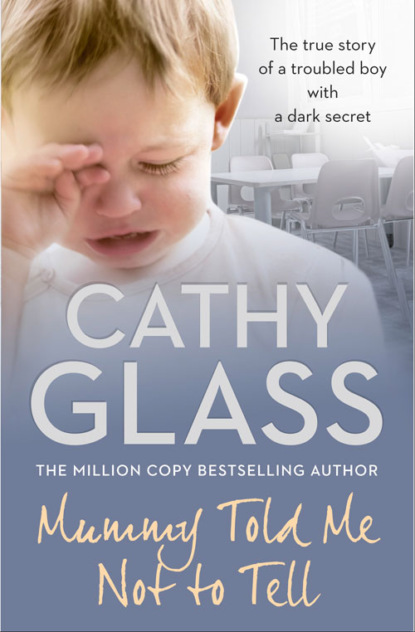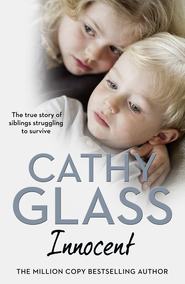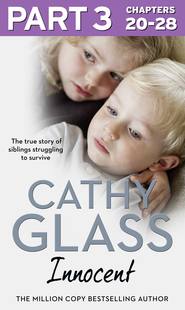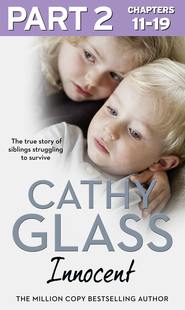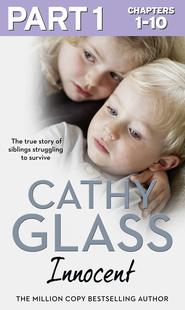По всем вопросам обращайтесь на: info@litportal.ru
(©) 2003-2024.
✖
Mummy Told Me Not to Tell: The true story of a troubled boy with a dark secret
Настройки чтения
Размер шрифта
Высота строк
Поля
‘I see,’ I said slowly, not liking what I was hearing.
‘When I was on the case I found a very poor level of hygiene in the house,’ Karen continued. ‘Susie and Reece were very dirty and smelt of stale urine. Mum is very loud and aggressive and the whole family shout at the top of their voices the whole time in order to be heard. Reece seems to have spent most of his waking hours in front of the television. When I last visited, although I was expected, he and Susie were watching an X-rated horror movie. Mum couldn’t see anything wrong in that and refused to switch it off. Reece is large for his age, heavily built, and he is developmentally delayed. He’s functioning at a pre-school level in many respects. Oh yes, and Reece bites. Mum nicknamed him Sharky some years back and it has stuck.’
‘He’s called Sharky because he bites?’ I asked, astonished.
‘Yes, I know, appalling, isn’t it? Mum and dad have indulged his behaviour. They seem to find it amusing, and even actively encourage it. They laugh at him when he bites, and throw food in his direction, which he tears apart with his front teeth. He also bites objects and people. One of the reasons for his exclusion from his previous schools was biting.’
I was silent, trying to take in what I’d just heard.
‘He has been excluded from two primary schools to my knowledge,’ Karen continued, ‘and he has had very poor school attendance since he first started school. The education department has been informed that Reece will be coming to you, so they will be looking for a school for him near you.’ Karen paused. ‘What else can I tell you?’
‘Contact? Will he be seeing any of his family?’
‘Yes. He’ll be seeing his parents and his half-sister Susie each week at supervised contact. He may also see some of his other half-brothers — it hasn’t been decided yet. I don’t know yet where the contact will take place. We were using the Headline Family Centre but mum has been banned from there. She has also been banned from the other family centre, Kid-Care. She’s a very aggressive woman.’
‘She must be. I’ve never heard of anyone being banned from both the family centres before.’
‘No, neither have I, but believe me, her behaviour merited it. Reece has obviously seen a lot of violence at home, and when he is frustrated he resorts to aggression. There have been no boundaries at home, no discipline at all. My feeling is that he and Susie should have been removed years ago.’
‘So why weren’t they?’
Karen sighed. ‘I don’t know. Unfortunately there have been a lot of changes of social worker, and mum is very good at getting what she wants and controlling people. She shouts and threatens, and with her volatile and erratic behaviour most professionals who have dealt with her just seem pleased to get away in one piece. When we removed Reece and Susie, there were two social workers and three police officers present, and there was only mum and the two children at home. You can’t reason with her: it’s impossible. She often comes into the council offices and we have to have security remove her. She was in again this morning, demanding to know where Reece was being moved to. We didn’t tell her, obviously.’
Good, I thought, and please make sure my contact details aren’t accidentally disclosed, as had sometimes happened in the past with previous placements.
‘From what I know of Reece,’ Karen said, trying to finish on a positive note, ‘he’s not really a bad kid. I’m sure his aggression is learned behaviour from home.’
‘Yes, it usually is,’ I agreed.
‘Can you think of anything else I can tell you that might help?’
‘Not at present. Thanks, you’ve been very helpful.’ ‘Thank you for taking Reece. We were getting desperate,’ Karen said.
That evening when Lucy and Paula were home and we’d eaten, I took the opportunity to tell them of our new arrival before they started their homework or television watching. Lucy and Paula were fully aware of the implications of fostering a child with ‘challenging behaviour’ and, knowing they had a well-developed sense of humour, I decided to take a light-hearted approach.
‘Ladies,’ I said, as we loaded the dishwasher, ‘you know what a quiet time we’ve had over the last couple of months — just doing the respite fostering?’ They looked at me cautiously, suspiciously almost. I smiled. ‘Well, I thought it was time for a change, something to liven us up a bit.’ I smiled again. ‘Tomorrow a boy called Reece will be coming to stay with us. He is seven but has learning difficulties, so functions at a much younger age. Although he shouts, bites and hits people when he is frustrated, I’m sure with all our help he will soon change. What he needs more than anything is stability and boundaries—’ and I was about to continue with a few reminders on how we would achieve this when there was a chorus of:
‘Can’t someone else have him?’
I looked at them sombrely. ‘They have. We will be his fifth carers in six weeks.’
Another chorus: ‘You’re joking!’
‘No.’ And I could tell by their expressions they were shocked and knew, as I did, that whatever Reece threw as us, physically or emotionally, he couldn’t have another move, and would stay with us until the court made its decision on his future, which would take the best part of a year, or longer if the case was complicated.
Chapter Three Sharky (#ulink_40a041fd-a228-524e-84e8-698afd35e882)
Jill phoned at just gone 11.00 the following morning and I felt my stomach tighten. I’d had a night to sleep (or rather not sleep) on all that I’d heard about Reece and, despite years of fostering, my nerves were starting to get the better of me. Supposing his behaviour was as bad as had been reported and I wasn’t able to help him? Supposing this was the one child I had to give up on? I pulled away from that thought.
‘A male social worker, Imran, will be bringing Reece,’ Jill said. ‘At about one thirty. I’ll aim to be with you half an hour before — at about one.’ Jill tried to be with me when a child was placed, partly to make sure the paperwork was all correct and also for a bit of moral support.
‘OK. Thanks,’ I said.
And I believe Karen phoned you yesterday.’
‘Yes, she was very helpful.’
‘Good. She worked with Reece’s family for a while. It’s a pity she’s not still on the case. She’s very practical and down to earth.’
‘Yes.’
We said goodbye and I returned upstairs, where I was putting the finishing touches to what would soon be Reece’s room. With Lucy and Paula at school and college, and Adrian away at university, I was alone in the house and it seemed very quiet. Not for long, I thought. In a couple of hours I’d have Reece to entertain me! I finished putting the Batman duvet cover and matching pillowcase on the bed, and then I glanced around the room. I hoped Reece would like it. I’d put posters of Star Wars on the walls, and jigsaws and puzzles in the toy box; and, mindful that Reece was functioning at a much younger age, I’d included a poster of Winnie-the-Pooh, two soft cuddly toys and a wizard castle with play people.
I always try to make the child’s bedroom suitable for their age and gender, with things that are likely to appeal, based on the information I have on the child. If the child comes with a lot of their own personal possessions, then I pack away what they don’t want of my things and put up theirs instead. It’s so important for the child to have their possessions around them: it helps them to settle and makes them feel secure.
As I had been doing respite fostering for three months, the theme in the room had changed repeatedly and as a result there were little nests of drawing-pin holes where posters and pictures had been up and down. I’d filled them with a quick coat of paint, a pot of emulsion being another essential tool for good fostering.
At twelve noon I was about to have a bite of lunch when the phone rang. It was Jill.
‘Sorry, Cathy, will you be able to manage alone this afternoon? I’ve been called into our south county office. One of the workers has gone home sick.’
‘Yes, don’t worry. I’ll be fine.’
‘Phone my mobile if you need anything. Otherwise I’ll phone you later after Reece is placed.’
‘All right, Jill.’
Jill being unable to attend when a child was placed had happened before and I wasn’t unduly concerned. I’d been fostering long enough to know the procedure and Jill knew that. Had I been new to fostering another worker from Homefinders would have come in her place, but I could cope — so I thought!
By 1.30 I was as prepared as I was going to be for Reece’s arrival. I wandered in and out of the front room, glancing up and down the street from behind the net curtains. Nerves were starting to get the better of me again, and I wished Reece had arrived as an emergency placement as Sam (and others before him had done); then I wouldn’t have had this build-up. But I reminded myself that if I was feeling anxious, goodness knows what Reece must be feeling, on his way to his fifth new home in six weeks.
At just after two o’clock, when there was still no sign of Reece, I began thinking about giving Jill a ring to make sure everything was going according to plan. I gave one final glance through the front room window and as I did a silver car drove up and stopped outside the house. I looked out from my vantage point behind the nets and saw a boy who’d been in the rear of the car scramble over the top of the passenger seat, fling open the passenger door and leap out on to the pavement. Aged about seven, heavily built with a shaved head, he began jumping up and down, yelling at the top of his voice: ‘Beat you! Beat you out! Beat you out the car, slag!’
Reece had arrived.
As I watched, a woman, who I assumed must be a social worker, jumped out of the driver’s seat, ran on to the pavement and grabbed his hand. ‘Don’t do that!’ she cried, anxiously. ‘It’s dangerous. You should have waited until I got out.’
Reece, oblivious to her caution, continued jumping up and down, still shouting: ‘Beat you! Beat you, slag!’ Then he tried to head-butt her. I flinched as he narrowly missed her nose.
I began towards the front door, making a mental note that when Reece was in my car I would have the central locking down, rather than just the child locks, until he learned to stay in his seat until I opened his door. I also made a mental note to keep my head up as I greeted Reece, for clearly head-butting was another of his accomplishments.
‘Hello,’ I said, smiling, as I opened the front door and they came down the path. ‘I’m Cathy, and you must be Reece?’
The social worker was holding Reece’s wrist to stop him from running off — he clearly didn’t want to hold her hand. As they came into the hall she transferred his arm to me and sighed.
‘Hello, Reece,’ I said, not bending to his height. He didn’t look at me but stared and then lunged down the hall. I kept hold of his arm and he pulled against me.
‘Leggo! Leggo of me,’ he yelled.
Другие электронные книги автора Cathy Glass
Innocent




 0
0





